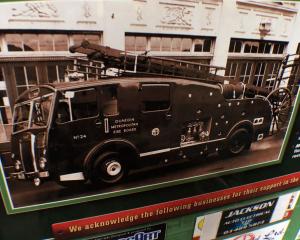
The 57-year-old said firefighting had been his life for the past 38 years, and it was time for a lifestyle change.
Too young to retire, he had a new job lined up and was looking forward to starting after his last day with the fire service on November 15.
He did not want to say too much before details of the new job were finalised. However, he would be working with people and helping them as part of a team, much like his favourite aspects of his firefighting job, but without the responsibility and stress that came with being the chief.
He was not sure exactly what he would do with any spare time the hoped-for lifestyle change would afford, but he was a "real family man", and looked forward to spending more time withhis 23-year-old twin daughters and his extended family.
"Maybe, I'll even take up bowls."
It was family who got him into firefighting in the first place, he said.
When he joined the Dunedin fire brigade as an 18-year-old probationary firefighter in 1972, he was the third Seque to line up - older brothers Doug and Pete were already working there.
His oldest brother, the late Doug Seque, retired about 1980 and Pete retired in 1995.
"Between us, we had 97 years in the fire service."
He had worked in Dunedin all his career, except for three years as a fire safety officer in Invercargill from 1989.
He was appointed Dunedin's fire chief in 1998. In 2009, he also took on the role of area manager for East Otago, which included Dunedin and Clutha and took in 21 volunteer fire brigades and six urban brigades.
Probably the biggest fire he attended was at Bracken Court in central Dunedin in July 2005, he said.
He was in command of the fire response, a task made difficult by the building's age and its location among other structures.
The Stavely Building fire in Jetty St in March 2008 was another tricky fire to deal with, he said.
Other big fires he fought which also stuck in his mind included the Radio Otago House fire in Moray Pl in 1997 and the fire that destroyed a historic paper mill at Woodhaugh in 1983.
The fire service had changed significantly in 38 years. It had a much more proactive focus and its tasks were more diverse.
Firefighters were trained these days to deal with more emergency management situations, such as road-crash rescues, hazardous chemical spills and medical responses.
But some things were still the same. The fire service was a family and a job to be proud of, and the community still had a great respect for the profession.
Firefighting was a rewarding job, which was why people became hooked for an entire career.
"It's satisfying, varied and you are working in the community. It's not a mundane job - it's challenging. You're using your skills."
He would miss the camaraderie of his Dunedin Fire Service family, but had been thinking about making the move for some time, Mr Seque said.
He and wife Heather had discussed his retirement well before her death from breast cancer earlier this year, and while it was not the reason for his final decision, her illness was one of many factors he considered.
"It doesn't ring my bells any more. It's time for a life change."
A replacement had not yet been appointed, he said.



